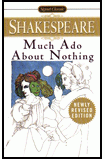Before Reading the Play
Before asking students to read the play, the story of Theseus should be told to them. The instructor can either read a version to them, such as the one found in Switzer and Costa's Greek Myths: Gods, Heroes, and Monsters or tell a shortened version. Make sure to include the fight with the Amazons and the kidnapping of Hippolyta. It would be a good idea also to read the myth concerning Pyramus and Thisby so that students will understand the reference when they get to the play within the play.
Themes
Students can be prepared further for the play through discussions of the major themes: love, friendship, and illusion versus reality. Discussion, either in small groups or with the whole class, is an effective activity. The following can be discussed:
Love
- Ask students to list as many different kinds of love as they can think of—parent for child, person for pet, etc. Group these kinds of love in as many ways as possible such as by age, importance, etc.
- Divide the class into an even number of groups. One half of the groups will devise arguments in favor of love for and duty to parent taking precedence over all other loves and duties. The other half of the groups will devise arguments against. Pair up groups to debate using their lists.
Friendship
- Ask students to consider what friendship means. Have them list the attributes of a good friend. After reading the play, a discussion of how well these attributes fit the four young lovers and the artisans would be profitable.
Illusion vs. Reality
- Have students consider the following questions:
- To what extent can one believe one's own eyes?
- What is the nature of reality?
- In what ways is illusion important?
- What part does imagination play in romance?
- Why do we need illusions in our lives?
Shakespeare and His Theater
If students are not familiar with Shakespeare's life and career or with the structure of the Shakespearean stage, it would be helpful to read and discuss "Shakespeare: Prefatory Remarks."
Introduction to the Play
- After reading the "Introduction," students may want to research Elizabethan celebration activities for Midsummer Nights, June 23rd, and how these might then relate to what happens in A Midsummer Night's Dream.
- Read Enid Welsford's essay from The Court Masque, pp. 143-154. In an oral report to the class, explain in your own words as much as possible the genre of court masque and how A Midsummer Night's Dream fits this genre.
- Research the world of Athens. What would the lives of Athenians such as those in the play have been like?
- Research how Elizabethans viewed fairies. Was this part of the plot more consistent with the Athenian world or the Elizabethan world?
- Discuss how Shakespeare combines his world with the period in which the play is set. See the Suggested References for suggested sources.
- Research and discuss how Elizabethans viewed marriage. Who made decisions about whom young women of means were to marry? If students have read Romeo and Juliet, discuss similarities of this aspect of the plots.
While Reading the Play
- Keep track of the four plots (the marriage of Theseus and Hippolyta; the mixed-up love affairs of Lysander, Hermia, Demetrius, and Helena; the preparation and performance of the play by the Athenian tradesmen; and the quarrel between Oberon and Titania) as they emerge in the play. Note where the plots meet and overlap.
- Using Clemen's comments about Puck as the play's interpreter, look for examples to sue later in writing an essay based on those observations.
- Make note of each time the word "dream" is used in the play and how it is used. For example, Hippolyta in her first speech says, "Four nights will quickly dream away the time," (I, i) in reference to time passing until her wedding with Theseus. Lysander says, "...short as any dream," (I, i) in explaining to Hermia how quickly their hopes for a life with each other are dashed.
- Make note of each time the word "moon" is used in the play and how it is used. For examples, Theseus mentions moon in I, i, in reference to the stages of the moon. He says the old moon lingers and is impatient for the new moon to come so he can get married. Hippolyta says the new moon will soon behold their marriage ceremony (I, i).
- Clemen says the main theme of the play is the transitoriness and inconstancy of love. As you read, find examples to support his statement
- Note how the language of the artisans (Bottom, etc.) differs from that of the court (Theseus and Hippolyta), of the lovers (Hermia, etc.), and of the fairies (Oberon, etc.). What is achieved by this variety? Compare Theseus's first lines Hippolyta, "Now, fair Hippolyta, our nuptial hour/Draws on apace..." (I, i) to Lysander's first speech to Hermia, "How now, my love! Why is your cheek so pale? (I, i). Oberon's greeting to Titania, "Tarry, rash wanton: am not I thy lord?" (II, i) in sharp contrast to the other two examples. Be sure to note the mistakes in vocabulary the mechanicals make, whether the actors are speaking in poetry or prose, and what difference that makes. Reread pp. xxxiii-xxxv for other ideas on language.














